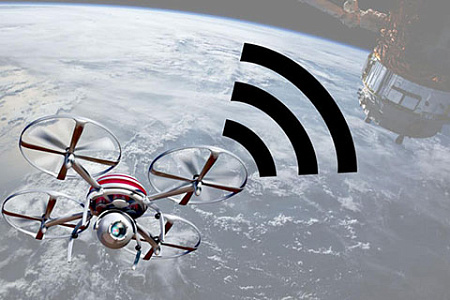Russian Space Systems will develop the latest technologies for drones and aviation The development of new domestic unmanned aerial vehicles (UAVs) with a take-off weight of up to 30 kg in partnership with the leaders of the Russian market of space instrumentation, avionics and ground-based means for aviation is being started by the Russian Space Systems Holding (RKS, part of the Roscosmos state Corporation).
UAV developers within the framework of the consortium integrate instrument, information and navigation technologies developed in space into unmanned systems and organize the serial production of aviation robotic means at the production facilities of the RKS.
The creation of UAVs became possible as a result of combining competencies in the field of microelectronics, inertial systems, gyroscopy, noise-proof navigation, aviation hybrid power plants, composites into a single pool. The implementation of the initiative minimizes dependence on imported components and products in the field of UAV production. Combining the efforts of high-tech developers in space instrumentation has made it possible to overcome the shortage of foreign equipment.
In addition to the RCS, the new partnership includes: JSC "Intersectoral Engineering and Design Center" (MICC) as the main coordinator of work, manufacturer of radar, radio navigation equipment and remote control radio equipment of JSC Kotlin-Innovator, GC Basic Technologies is one of the leaders of the domestic market of research in the field of artificial intelligence, radar and semiconductor electronics. A number of other companies are considering participating in the project. Serial production of the devices is planned to be organized at the facilities of JSC Yaroslavl Radio Plant, which in 2022 became part of the RKS holding and now produces onboard equipment for most domestic space projects.
RKS emphasize that they do not intend to make money on sales of final products – it is important for the holding to load its capacities and provide the consortium with access to information and space technologies and components that are actively used in the creation of onboard and ground equipment for satellites. The results of the interaction will be the emergence of new UAVs for various purposes and the integration of relevant technologies, intellectual power and production capabilities of partners.
Tough sanctions have opened the eyes of the industrial community to how dependent the country is on foreign products and – at the same time – what a great design and market potential is now in our hands. The elaboration of the idea showed that domestic solutions for the creation of unmanned systems will be several times cheaper, since, in fact, the state has already financed through the rocket and space industry the development of many products and technologies suitable for the field of UAVs. Roscosmos has repeatedly stated that the rocket and space industry has a great desire and opportunity to "lend a shoulder" to the aviation sector, primarily in the field of replacing imported instrumentation and electronic components with domestic ones. This should be done not in the form of foreign analogues integrated into the "board" element by element, but to offer a functional replacement of devices, as has already been done in space instrumentation.
The consortium may become the first experience of cross-industry cooperation in relying on the production facilities of the RCS as a high-tech factory of unified devices and modules. The successful implementation of the project and the acquired experience will allow scaling the development from the light UAV sector, where certification is easier, to the manufacture of domestic functional analogues for, for example, the entire civil aviation industry. "UAV manufacturers have a great demand for radio lines, autopilots, sensors, integrated avionics solutions," says Vladimir Semenov, CEO of MICC. – The RCS already has many similar technologies, but they were created for other conditions and tasks. Now this reserve needs to be improved to meet the new mass-dimensional and tactical-technical characteristics. At the same time, it is necessary to produce such products in series and based on the constantly changing requirements of the market. Our goal is not to achieve piece production with some "twists" from Chinese chips, but to enter the series – at the level of domestic integrated circuits and on the advanced technologies available in Russia."
The active use of UAVs has become the norm today, especially when information about the real picture is needed. There is a growing demand for special-purpose drones, as well as for means of countering UAVs. The competencies implemented in space can also be used in the air sphere – with an eye to the functions inherent in spacecraft or space complexes. And the RCS and its partners intend to meet these needs, and serially, inexpensively and on the basis of independent domestic technologies.
"Not only large attack drones pose a threat to the security of protected objects, but also sedentary observation multicopters that carry out unauthorized filming," says Alexey Tsarkov, Deputy General Director of Basic Technologies Group. "Observational multicopters, difficult to detect due to their small size, can stay in the air above a protected object without moving for a long time, which makes them invisible to classical air defense radars using the Doppler effect."
The technologies and principles used in space are exactly the same that are necessary for the serial production of domestic UAVs and specialized ground systems. This applies to radio communications, frequency ranges used, navigation, noise immunity technologies, noise immunity, radio navigation and control of highly maneuverable objects. For implementation, temperature sensors, angles, pressure, displacement, inertial sensors, pendulums, magnetometers, gyroscopes and accelerometers are needed, which are widely used in domestic space technology.
Today, RKS Holding has high competence of personnel, experience in the development and serial production of systems on a chip and systems in the hull, navigation modules, as well as many other components for aircraft and UAVs.
Dmitry Safonov Dmitry Viktorovich Safonov is a journalist.

